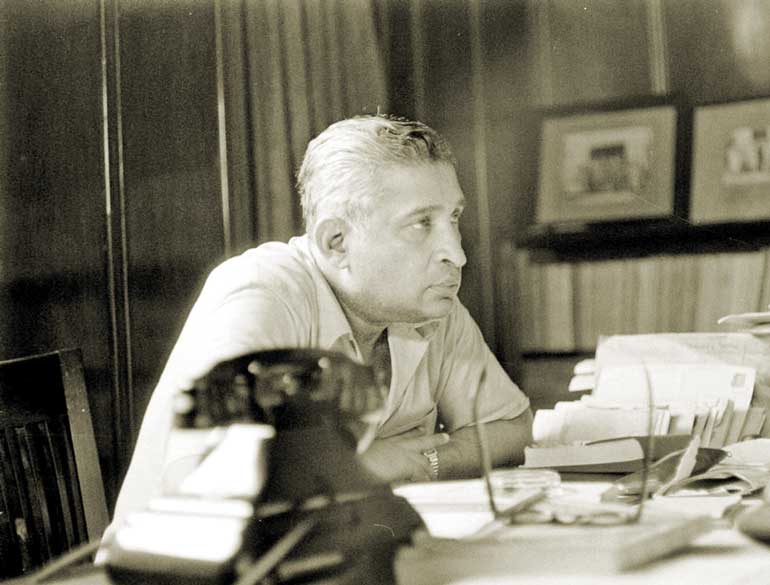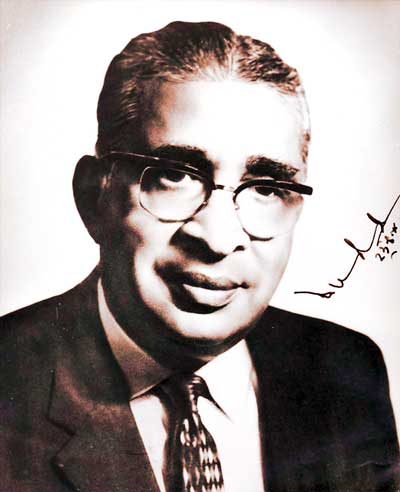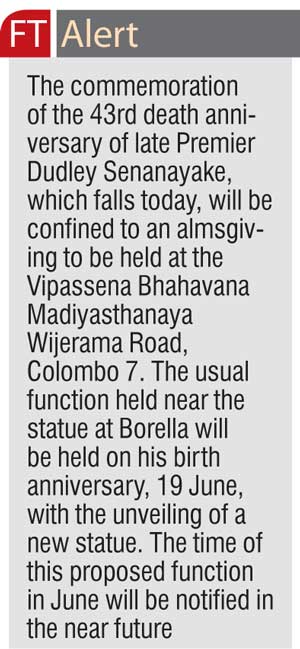Monday Feb 23, 2026
Monday Feb 23, 2026
Wednesday, 13 April 2016 00:00 - - {{hitsCtrl.values.hits}}

A LIFE image of Dudley Senanayake
By Charnika Imbulana
Today (13 April 2016) marks the 43rd death anniversary of Dudley Shelton Senanayake, the second Prime Minister of our country, then Ceylon.
On this date every year as a tribute to this gentleman politician, his life is reminisced. I have in these columns for many years on such occasion given details of many aspects of his life and times – some researched, some I have experienced myself, and others quoting first-hand accounts of what was related to me – all worthy of putting pen to paper all the same.
The current and future generations must surely know. Yes, there lived political leaders who are worthy of being spoken of in volumes. Yes there lived such politicians when politics was conducted in the way it should be. It was then more the norm than the exception, although today it is the contrary.
When Dudley Senanayake departed unexpectedly from this world, he was not the Premier, nor a leader of the Opposition but yet an unprecedented crowd, estimated at well over one million, thronged to Colombo for his funeral in 1973. An aerial snapshot taken by Daily Newspapers of Independence Square at the time of Dudley’s cremation shows a sea of heads as far as the eye can see – this itself was testimony to how he was regarded by the nation.
Born on 19 June 1911 to Molly Dunuwila and Don Stephen Senanayake, Dudley was the eldest of their children, two sons and a daughter. Dudley was identified as the mischievous one. Both Dudley and his brother, Robert received their secondary education at the prestigious S. Thomas’ College, Mount Lavinia where their illustrious father D.S. Senanayake (the first Premier of Ceylon) also studied from 1892 to 1902. Dudley excelled in his studies and sports.
The famous father and the sons played cricket for S. Thomas’ College, with distinction. Dudley became the Head Prefect, captained the college team at cricket at the famous Royal-Thomian encounter and gained colours in Hockey, Boxing and Athletics. Established as an all-rounder, Senanayake gained entrance to Corpus Christi College, Cambridge and University of Cambridge, to read for Natural Science Tripos and later was admitted to Middle Temple as a Barrister.
After returning to Ceylon from the University of Cambridge, having entered politics in 1936, Dudley Shelton Senanayake sought nomination and received same to run for State Council elections, while his father was a minister in the Council.
After his father took office as the first Prime Minister, his son D.S. junior, known fondly as “Dudley” became the Minister of Agriculture, a portfolio he held up unto the time he was unexpectedly appointed Prime Minister six years later succeeding his father, after his father’s fatal fall from a horse.
He was thrust the Prime Ministership on him at the most difficult time of his life. Upon his father’s sudden death. And then he faced much political crisis and turbulence. But he remained a colourful parliamentarian and much-loved leader. Although his leadership was  constantly riddled with difficulties, however he had a full run as PM from 1965 to 1970.
constantly riddled with difficulties, however he had a full run as PM from 1965 to 1970.
A friend of all communities, and a devout Buddhist who respected all religions. He was modest and unassuming. As PM one would see him drive his own ‘Triumph Herald’. He was stopped at Castle Street for speeding. He was on his way for golf, another passion of his. Dudley praised the Police Constable in carrying out his official duty to the letter and apologised, promising never to repeat the mistake. This was his noble character. He possessed a charismatic personality.
The golden era of Parliament
In this year’s tribute to him on his death anniversary, I wish to focus firstly on his oratory and wit, both of which he excelled in Parliament and out, that earned applause.
We are living now in an era where Parliamentary privilege is misused with impunity and the Standing Orders disregarded and where discipline is at its lowest and un-parliamentary language in the Parliament House is the order of the day. Reflecting on the golden days of Parliament and of the then learned Members of Parliament is thus so refreshing but a grim reminder to what depths, the august parliamentary chambers has fallen to, today. It has to be even called for a written code of conduct!
The years that Dudley served in the State Council, and later after Independence, in Parliament, was the Golden Era of parliamentary English oratory in Sri Lanka. They maintained the highest discipline in the august assembly. It was an education to listen to these great leaders. There were several Ministers and MPs with a flair for oratory and they all belonged to the highest tradition and were regarded as classic in style. They all spoke without notes.
Pre-eminent among them were S.W.R.D Bandaranaike and G.G. Ponnambalam whose eloquence of English diction and power of delivery were unmatched. SWRD was in addition to possessing amazing wit, adept at repartee and the sudden thrust. Colvin R. de Silva was an orator who belonged to a different tradition. He was the most volcanic speaker in the House, fluent, rhetorical, dramatic and verbose, but equally, analytical.
He studied his brief very carefully and would argue it as he would a case in the Supreme Court. On the other hand Pieter Keuneman was a typical Cambridge Union speaker, in the best tradition of the British Parliament, fluent and precise, but suave and with no histrionics to match Colvin. W. Dahanayake was loquacious and boring but could talk on and on. The old school politicians would speak of how he held the record for the longest speech ever delivered in the old State Council!
Amongst this galaxy Dudley too held his place both in fluency of language and the power of delivery. But he was most known for his exceptional talent in devastating wit. He displayed his mischievous nature not only at home but also in Parliament.
Once, Dudley who was then the PM, was on his feet, Stanley Tillekeratne (who was not more than 4ft 6in tall) then a member of the Opposition, kept taunting him about “splits” in the UNP coalition. Dudley paused a moment and addressing the Speaker said, “Mr. Speaker, I am not surprised that at his height the Hon. Member for Kotte can see nothing but splits”. While the House roared with laughter, Mrs. Bandaranaike who was seated next to Tillekeratne visibly blushed with amusement.
On another occasion, Maitripala Senanayake, MP for Medawacchiya, who was known widely to be having a clandestine relationship with a Tamil lady, Ranji Handy (whom he married later), kept taunting Dudley over the concessions that his Government was allegedly granting to the Tamils. Whereupon Dudley shot back at Maitripala, “Mr. Speaker, I must congratulate the Hon. Member for Medawacchiya on his finding a way to observe ‘Sinhala Only’ by day, and the ‘Reasonable Use of Tamil’ by night.”
The House rocked with laughter.
In Dudley’s time, wit in the House was of a high class, SWRD and Dudley were known to be the best exponents. Firebrand MP  Vivienne Goonewardene was speaking on the borrowings by his Government, Dudley retorted, “I will never borrow you!”
Vivienne Goonewardene was speaking on the borrowings by his Government, Dudley retorted, “I will never borrow you!”
Elected to Parliament as Prime Minister
Although Dudley was given the Premiership on a platter as it were, he desired a fresh mandate from the people to head the country and he called for elections just two months later and was re-elected receiving even a larger majority than his father did.
Among other things, increased welfare benefits, the rice subsidy, in particular contributed to the resounding victory. The Government however became unpopular a year later, in 1953, when the price of rice was raised and subsidies were cut. Within a year, after the Korean boom ended, the Government found that the burden of the subsidy on the Budget was excessive and decided to curtail the subsidy expenditures sharply. The price of rice was increased.
Other subsidies including free meals for school children were cut. The political protest to this move was explosive. A general strike, known as “Hartal”, was launched by very strong trade unions affiliated to the left-wing parties.
The lives lost in the 1953 Hartal caused him shock and grief. Though the UNP remained in power, Senanayake honourably resigned as Prime Minister, left Temple Trees for ‘Woodlands’ and left politics. After Dudley resigned, Sir John took over as Prime Minister.
He returned to politics in 1957 when the UNP lost elections. In March 1960, the UNP managed to form a government after elections and Senanayake became Prime Minister again, but the coalition fragmented and Dudley resigned as Prime Minister after only four months in office after new elections were held in which the UNP won less seats. He became the Leader of the Opposition and forced early elections in 1965 by persuading 14 supporters of Prime Minister Sirimavo Bandaranaike to defect.
An honourable politician
When a UNP-led coalition won power in 1965, he agreed to step down and hand over the Prime Ministership to C.P. de Silva as a mark of gratitude towards his service towards defeating the leftist coalition government in 1964. Such magnanimity! He was sworn in as the Prime Minister for a record fourth time on 25 March 1965, at which time he had the longest reign till 1970. However he lost the general elections in ’70 and virtually retired from politics thereafter.
My uncle, late P.C. Imbulana who served him as Deputy Agriculture Minister, sported a spontaneous smile on his face whenever he spoke of his dear friend Dudley. Now whenever I remember the stories my uncle related about his best friend to me, I can’t help but smile.
The two friends shared the same humour and innocent mischief. Their loud laughter would thunder the usual quietness of our ancestral house whenever he arrived, my grandma would recall. I could well imagine it when I now recall some of the stories, and my own vague remembrance of his infectious laugh.
When Dudley returned to Ceylon after his studies, his parents were keen that they should get their son ‘settled’ in marriage. Dudley was certainly the most eligible bachelor, hailing from one of the leading aristocratic families in the island.
Marriage brokers were assigned on a country wide search and the Senanayakes took their son to see several brides. One such visit was to an aristocratic walawwa off Balangoda. A sumptuous banquet was laid for the groom’s party and Dudley dug in with relish. There had been watalappan for dessert made from the choicest jaggery that Balangoda kitul palms produced. Dudley was seen helping himself to several servings of watalappan.
The pretty bride was dressed in a Kandyan osariya and bedecked in traditional jewellery. She was ideally suited and D.S. and Molly Senanayake were silently praying that their elder son would at least say yes to this proposal.
On the way back to Colombo, the parents posed the question: “So what do you think?”
“Hari shoak! Hari shoak” (excellent! excellent), exclaimed Dudley.
The parents much relieved said, “Oh we must not waste time in bringing Sirima home!”
By the mention of the name, Dudley asked, “Sirima?”
The parents responded: “Sirima is the name of the bride. Barnes Ratwatte Disawe’s daughter whom you just described as ‘hari shoak!’”
“Oh. I was commenting on the watalappan as being ‘hari shoak,’ not of the girl!”
The old Senanayake couple didn’t know whether to laugh or cry.
One wonders if Dudley had said ‘yes’ to the girl Sirima instead of to the watalappan, how the course of history of this country would have changed.
As a responsible member of the fourth estate, I would always ask my uncle, are these stories all true?
My uncle would roar with laughter, until his cheeks turned pink, enjoying the relating of these stories but in all seriousness state Dudley was never known to be dishonest.
I did see Buddhhika Kurukularatne in his ‘Men and Memories’ also verifying the story with former Secretary General of Parliament, Sam Wijesinghe, which gives me more confidence now to state it in black and white.
He also had relished relating how, during his very first meal at Cambridge, a piece of meat on his plate did a pole vault to another diner’s plate some distance away, he had explained in all seriousness it happened due to a blunt knife kept for him to use. My uncle remembered to relate this when he watched with us the comedy ‘The Party,’ where a piece of chicken flies off the leading actor Peter Seller’s dish into the air and gets stuck on a hair- do of a woman.
Dudley loved photography, wildlife, and cricket and golf. He was a man of impeccable integrity. Food was a subject of discussion right throughout his life, as he was often jokingly told and known to have quite an appetite. Although Dudley acknowledged even that with good humour, his good friend, my uncle would drily say that he just enjoyed his food. But it was his stomach that gave trouble to his last breath. When he died he was only 62 years, gone so early, a life that was so worthy.
I quote two passages from speeches made in Parliament by two eminent Parliamentarians who knew him well upon his passing away. The former had political differences with him and they constantly locked horns and was livid when a “ginger group” within the party was formed by Dudley (of which my uncle was one) but yet JR held Dudley with deep affection and respect, his emotions took the better of him, at Dudley’s passing.
J.R. Jayewardene: “Here was a colleague who touched the deep sea of reverence in a wider world in our country than possibly any other person in its long history. If a man could draw that affection and goodwill, he has a claim to be known as one of its greatest sons.”
Gamini Dissanayake: “Mr. Dudley Senanayake should be remembered as he really was in life – a simple man with his share of human frailties, minus the airs and props that accompany high position, and a man who by his simple ways constantly reminded us of the truth of the saying, ‘A truly extraordinary man is in the final analysis a truly ordinary man.’ The iron heel of totalitarianism never appealed to him. The arrogance of power was not a part of his constitution. He was a true democrat who only believed in the democratic approach towards the solution of ills. Trade unionists, political opponents, power lobbies and agitators of diverse hues and colours will bear testimony to his spirit of democratic toleration and moderation.”
“Good night sweet prince,” said JR in his fitting final farewell.
The writer likes to remember him in this tribute with her own line: Greatness was thrust on Dudley Shelton Senanayake. And he lived to be great.
(The writer is a Committee Member of the Dudley Senanayake Commemoration Society.)